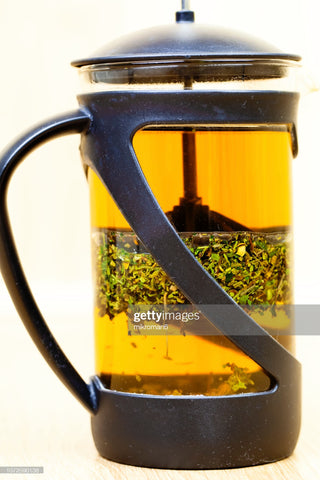Tea vs. Infusion vs. Deocotion?

When I first became interested in herbalism several years ago, I was already enamored with blending and drinking teas, but infusions and decoctions sounded like complicated experiments that I knew has something to do with water and herbs...my knowledge pretty much ended there. So, one day when I was reading a blog post, I was delighted to learn that brewing infusions and decoctions are just as simple and easy as making a cup of tea, only with a bit more time involved. The usefulness of knowing all three methods comes in when you consider what properties you are hoping to extract from a given herb. The water temperature, passage of time, and herb-to-water ratio all produce different results with different plants. We are (almost) all familiar with these principles when brewing a pot of coffee - the wrong ratio produces a cup that is too weak or strong, and leaving the grounds in the french press for too long imparts an unpleasant bitterness, but when made correctly, you're left with a pleasantly flavored, aromatic, warm beverage to enjoy. Learning how to extract herbal properties through water for maximum ingested benefit is much like learning how to brew the ideal cup of coffee.
The breakdown
The general understanding of herbal tea is pouring hot or boiling water over a teaspoon or two of herbs and allowing to steep for 2-10 minutes. An infusion is basically just a more calculated, medicinal strength tea. Infusions typically involve one ounce of dried herb infused in one quart of water for 4-12 hours, giving water-soluble properties like minerals time to extract. A decoction is the method of placing herbs in a pot of water, bringing to a boil, and then simmering for around 20-60 minutes.
Tea

What's a reason you would choose tea over an infusion? Convenience, for one. Sometimes you don't have 4-12 hours to spare. Mint leaves are some of my favorite herbs to drink in tea form. Mint teas are wonderful digestive aids to sip on after a meal. This is due to the presence of volatile oils - those same oils that give off that minty scent promote our digestion by stimulating bile production, especially helpful after eating particularly rich, dense meals. Volatile oils also quickly evaporate in hot water, so drinking an infusion of mint would get a much smaller quantity of these oils into the body, as they will have largely evaporated after the passage of hours. In fact, while a mint infusion surely offers extracted properties with benefit of their own, the taste is quite bitter, not like the pleasant zing a lovely cup of peppermint tea offers. As in the case of peppermint, knowing what properties we're looking to extract helps us decide what method would be optimal in preparing our herb.
Infusions
The first herbal infusion I ever made was red raspberry leaf. I remember cleaning an old apartment while I listened to a podcast where Rosemary Gladstar was a guest. I can't remember what podcast it was, but I remember her conveying how simple it truly was to make nourishing, nutritive infusions that could fortify our health. As I had loose raspberry leaf on hand at the time, it become my first truly infused herb, which I let steep for about 20 minutes. I was fascinated by this idea that different properties of the plant, like minerals, could be extracted with the passage of time.

Basically, an infusion is a medicinal strength tea, which means it is allowed to steep for 20 mins - 12 hours, and are consumed to promote and sustain health. Infusions are able to extract much more of the vitamins and minerals than a shortly-steeped cup of tea.
Decoctions

Decocting herbs involves placing the herbal material in a pot of water, brining to a boil, and steeping for 20 minutes to an hour or more. I think of using this method for heavy materials that are not so easily extracted into water, like resins. Barks and berries make good candidates for decoctions, as the prolonged heating process can help extract heavier elements from these plant materials. A common decoction many people may be familiar with is the preparation of mulled wine. Mulling spices usually consist of cinnamon, nutmeg, allspice, clove, and other fruit rinds and peppercorns. These tougher barks and seeds benefit from a prolonged simmer to release their desired qualities.

Personally, I drink regular, shortly steeped tea most often, infusions nearly daily, and decoct herbs only for special preparations. Mainly, this is due to time and convenience, but it is very beneficial to consider your intended outcome from using a particular herb when considering how to prepare it. For example, lavender tea may provide a lovely steam of relaxing essential oils enveloping one's face while sipping. When infused for a prolonged period of time, however, lavender becomes increasingly bitter and unpalatable, and the essential oils will have mostly dissipated. For medicinal strength tea, I prefer to drink infusions steeped overnight, and some of my favorite herbs to do this with are nettles, oat straw, and lemon balm. I can feel my body becoming stronger, more nourished, and more balanced when I drink these, and they have become a joyful part of my life.
